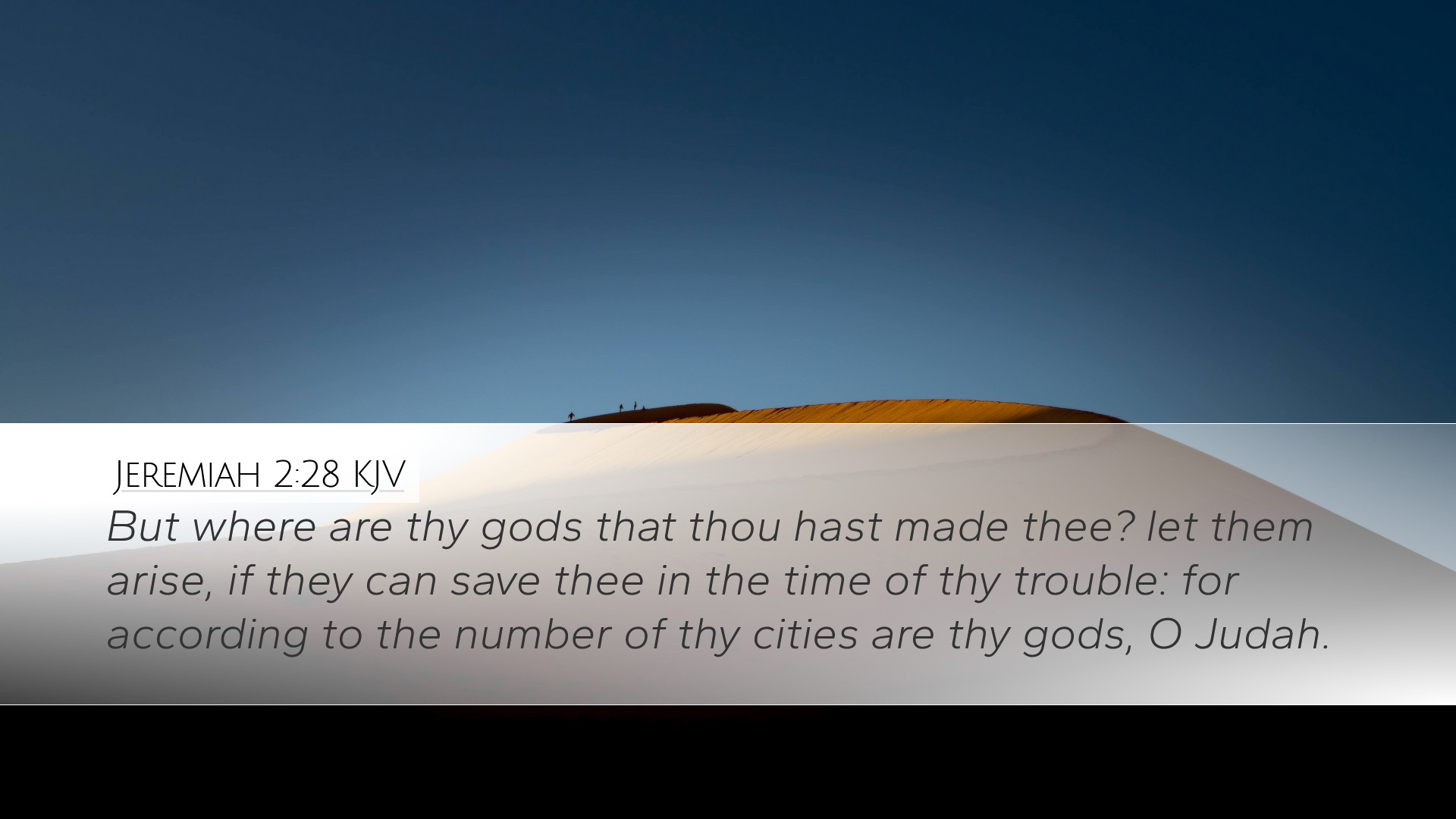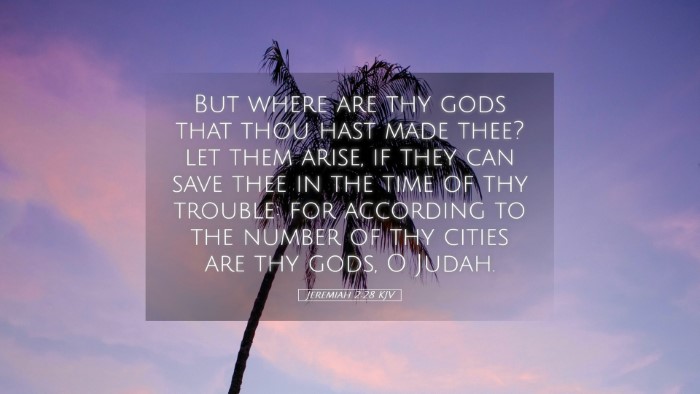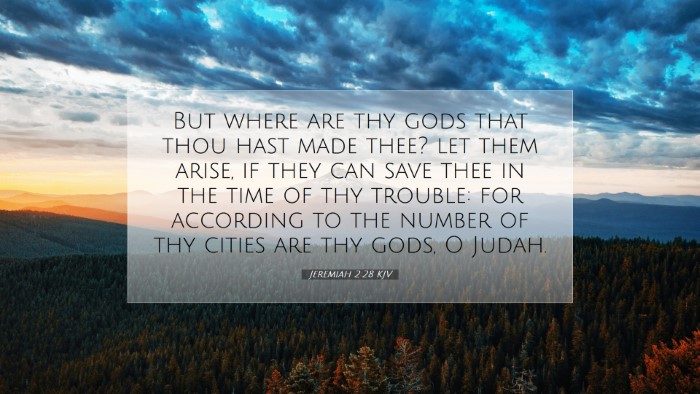Commentary on Jeremiah 2:28
Jeremiah 2:28 states: "But where are your gods that you made for yourselves? Let them arise, if they can save you in the time of your trouble; for as many as your cities are your gods, O Judah."
This verse is a poignant reminder of the futility of idolatry and serves as a central theme in the prophetic ministry of Jeremiah. It encapsulates the challenge posed to the people of Judah regarding their misplaced trust and reliance on false gods. The following commentary amalgamates insights from renowned public domain commentators such as Matthew Henry, Albert Barnes, and Adam Clarke, delving deeply into the meaning and implications of this verse.
Contextual Background
In the broader context of the Book of Jeremiah, this verse reflects God's lament over Israel's unfaithfulness. Jeremiah, called as a prophet, often speaks against the prevailing idolatry, urging the nation to return to their covenantal relationship with Yahweh.
During this time, Judah had turned to idols, confounding divine truth with pagan beliefs. This abandonment of the true God for man-made deities is recurrently addressed throughout scripture. The challenge presented in Jeremiah 2:28 underscores this spiritual crisis.
Analysis of the Verse
Idols of the Heart
Matthew Henry emphasizes the notion of idolatry as not merely the worship of statues but affirms its existence in the hearts of the people. The phrase "where are your gods" serves to mock the idols they constructed—a critique of their inability to save or offer solace in times of trouble.
Henry states that these idols were "the product of their own hands," revealing the absurdity of trusting in creations rather than the Creator. This reflection on human craftsmanship emphasizes the vulnerability of any entity that is not divinely ordained.
False Security
Albert Barnes notes that the verse presents a challenge to those who have turned to idolatry for security. By questioning, "Let them arise," there’s an implied confrontation of faith. Judah has opted for a false sense of safety, thinking that these gods would offer protection in perilous times. In contrast, a true understanding of God would render such beliefs ludicrous.
Barnes emphasizes that the mention of "as many as your cities" highlights the overwhelming nature of their idolatry—each city possessed its own god, illustrating the vast extent of their deviation from true worship. The sheer number of idols indicates a systemic failure to recognize God's omnipresence and sovereignty.
The Nature of God’s Call
Adam Clarke presents a theological reflection on the nature of God’s call to Israel through this verse. Clarke posits that God is effectively saying: "Look at the futility of your choices." He highlights that the appeal to idols delivers no value, especially in crises where the divine is needed most.
Clarke also draws attention to the loving but firm tone of God. Although the narrative is laden with rebuke, it hints at divine patience and a willingness to restore if the people would only turn back and recognize their folly.
Theological Insights
Character of Idolatry
The commentary reveals several layers of insight into the character of idolatry, as noted by the commentators:
- Human Craftsmanship Versus Divine Authority: The idols represent a deliberate choice to reject divine authority for human creativity, leading to hollow worship.
- Temporal Versus Eternal Security: Trust in idols signifies a focus on the temporal, neglecting the eternal assurance found in God.
- Collective Responsibility: The reference to cities implies a communal nature of idolatry, demonstrating that collective choices impact the nation's spiritual standing.
Call to Repentance
Jeremiah 2:28 serves not only as an indictment but also as a call to repentance. The underlying message is God's desire for Israel to return to Him and discard their idols. Each commentator underscores that God, despite Israel's rebellion, longs for reconciliation.
This verse acts as a litmus test for individuals and communities alike, questioning what or who they rely upon in times of trouble. The resemblance to today's context is striking, where various modern “gods”—money, power, success—demand allegiance and thwart acknowledgment of God’s sovereignty.
Practical Applications
For pastors, students, theologians, and Bible scholars, the insights from Jeremiah 2:28 can yield rich applications:
- Self-Examination: Reflecting on personal and communal idols is crucial. What contemporary gods do we serve?
- Preaching Repentance: Leaders are urged to guide congregations towards recognizing and renouncing their idolatrous tendencies.
- Reinforcing Faith in God: Directing the focus back to Christ as the ultimate source of salvation and security amidst life’s tribulations.
- Educational Endeavors: Promoting theological discussions surrounding idolatry and its implications in modern society fosters awareness and engagement.
Conclusion
Jeremiah 2:28 stands as a powerful reminder of the enduring danger of idolatry, resonating throughout biblical history and contemporary life. Through the insights of commentators such as Matthew Henry, Albert Barnes, and Adam Clarke, we are drawn to a deeper understanding of the text, revealing the futility of trusting in anything other than God.
As we ponder this verse, we are reminded to assess our own spiritual landscapes and turn towards the living God, who alone is capable of saving us in our moments of distress. By recognizing the seriousness of our idols, we can align our faith and practices in accordance with the truth revealed through scripture.


